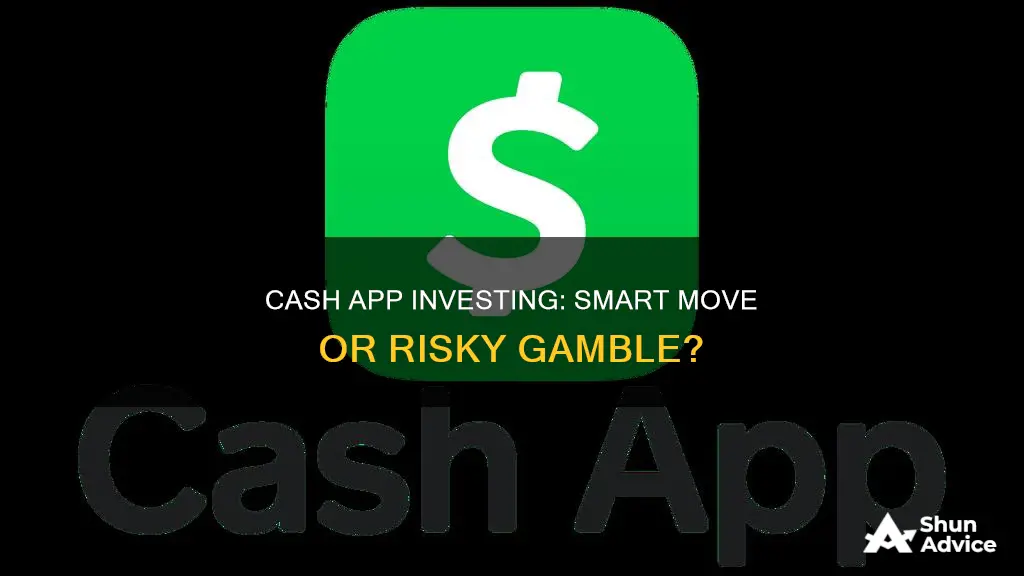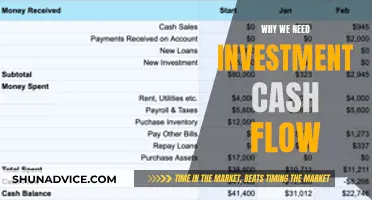
Cash App is a mobile banking platform that allows users to send, spend, save and invest money. It is an offshoot of the Square payments system, which was founded in 2013 by Jack Dorsey, who is also the founder of Twitter. Cash App offers a range of features, including peer-to-peer payments, a debit card with payment and ATM access, and stock, ETF and Bitcoin investments. It is a good option for beginners who want to pick and choose their stocks, ETFs and fractional shares. It is also suitable for those with small amounts of money who want to start investing. However, it may not be the best choice for serious investors, as it lacks certain advanced features and investment options.
What You'll Learn

Cash App's ease of use for beginners
Cash App is a great option for beginners looking to invest. The app is easy to use, with a clean and intuitive interface that makes it highly beginner-friendly. It isn't cluttered with options, so you can easily find what you need. All the necessary features are neatly displayed on the landing page, allowing any banking process to be completed in just a few minutes.
To get started, you can download the app from the App Store or Play Store and follow the on-screen instructions to install it on your mobile device. Signing up for a Cash App account is straightforward and only requires basic information. You don't have to enter your banking information when opening an account, but linking your bank account is crucial for using most of the app's features.
Here's a step-by-step guide to creating a Cash App account:
- Enter your phone number or email address.
- Type in the code sent to your phone or email.
- Optionally, link your bank account to the app by entering your debit card information.
- Enter your ZIP code.
- Create your $Cashtag, which is your unique username for sending and receiving payments.
Once your account is created, you can start receiving payments. If you want to pay for products and services, you'll need to add money to your account by linking a debit card.
Investing with Cash App is simple and accessible. You can start investing in stocks or buying Bitcoin with as little as $1. There are no trading commissions or minimum investment amounts, making it ideal for new and small investors. You can also buy fractional shares of a company's stock, allowing you to invest with as much or as little money as you want.
Additionally, Cash App provides tools and resources to help you make informed investment decisions. You can access analyst opinions, earnings reports, and alerts on market trends. You can also set orders to buy stocks automatically on a regular schedule or when a target price is reached.
While Cash App is designed for beginners, it's important to educate yourself about investing in the financial markets, including understanding the risks involved. Overall, Cash App offers a user-friendly platform that makes it easy for beginners to navigate the world of investing.
Cash Flows: Investing Activity or Not?
You may want to see also

The app's limited investment options
Cash App Investing is a good option for beginners who want to pick and choose their stocks, ETFs, and fractional shares. However, it has limited investment options compared to other brokers. For instance, it only supports about 1,600 to 1,800 stocks and ETFs, and does not support mutual funds, futures, or options trading.
Cash App Investing does not offer IRAs, custodial accounts, or margin trading. It also does not offer an advanced trading platform or assets like mutual funds, futures, or options trades. The only cryptocurrency available for trading is Bitcoin.
While Cash App Investing is beginner-friendly, other low-cost investing apps for beginners offer more investment options, more account options, and better resources.
Investor Growth: Cash Flow Impact of Investing Activities
You may want to see also

Cash App's security and fraud detection
Cash App uses advanced security features, including cutting-edge encryption and fraud detection technology, to protect your data and money. Any information you submit is encrypted and sent securely to their servers, regardless of the type of internet connection or data service you're using.
The app will always ask you to confirm a payment before sending money to someone new or not in your contacts. You will also be notified if your PIN or security settings are changed. Cash App will also ask you to confirm details only you would know when sending money internationally or logging in from a new device.
The app also offers a Security Lock setting, which requires your passcode, Touch ID, or Face ID for every Cash App payment. You can also enable notifications via text message or email so that you are alerted after every Cash payment.
To keep your account safe, Cash App recommends that you:
- Beware of scams and phishing attempts. If something sounds too good to be true, it probably is.
- Only reply to emails from people and organizations that you know and trust.
- Never provide sensitive information to anyone.
- Verify and double-check all recipient information before sending payments.
- Don't send money to someone promising you something in the future or to a love interest you haven't met in person.
- Don't send money to any Cash App account.
- Don't download any applications for "remote access" or complete a "test" transaction.
Cashing in on Investments: A Meryl Lynch Guide
You may want to see also

How to open and utilize a Cash App Investing account
To open a Cash App Investing account, you must be a U.S. resident and be 18 or older. You will also need to provide your Social Security number, U.S. residential address, employment status, and the name of your employer.
Cash App Investing is a self-directed individual brokerage account. This means that when you start investing with Cash App, you create a brokerage account with Cash App Investing LLC. This allows you to buy and sell stocks and exchange-traded funds (ETFs).
The balance associated with your Investing account is different from your Cash App balance. The balance of your Investing account is the total current value of your investments, and it is shown separately from your general Cash App balance. When making a stock or ETF purchase, funds are taken from your Cash App Balance. If more funds are needed to cover the remainder of the transaction, they are pulled from your linked debit card.
Any stocks or ETFs bought through Cash App Investing LLC are held by the carrying broker, DriveWealth, LLC. Once your stocks and/or ETFs are officially sold, the funds from the sale(s) will be automatically transferred to your Cash App Balance. You can then choose to buy more stocks, spend it on your Cash Card, send money to friends and family, or instantly Cash Out to your linked bank account.
It is important to note that executing your stock transactions relies on market hours and holidays. Trades may not happen as soon as they are scheduled, and if you buy or sell stocks or ETFs outside of market hours, your sales proceeds will not be available in your Cash App Balance until the next market hours.
Cash App Investing accounts are considered "zero-balance" accounts, which means that they maintain a cash balance of $0. However, when you choose to buy stocks or ETFs, the purchase amount is transferred from your Cash App Balance to your Cash App Investing account to make the purchase.
Your Cash App Balance is not Securities Investor Protection Corporation (SIPC) protected, but it may be subject to other protections, such as FDIC insurance.
Smart Ways to Invest 40K: Strategies for Success
You may want to see also

Cash App's ratings and customer reviews
Cash App has received generally positive ratings and reviews from customers and experts. On Google's app store, it has a rating of 4.6 out of 5, while on Apple's app store, it has a rating of 4.8 out of 5. The Better Business Bureau has given Cash App an A+ rating.
Reviews praise the app's ease of use, low costs, and account minimums. The app's ability to send and receive money, its debit card, and its investing features are also highlighted. One review notes that Cash App is "definitely one of the most beneficial apps on your phone" and that it is particularly useful for "person-to-person transactions between friends and other people you trust."
However, some reviews mention issues with fraud and hacking, and one user complains about poor customer service. Another review mentions that Cash App is not suitable for serious investors due to its limited stock and ETF selection and basic charting and features.
Overall, Cash App appears to be well-regarded for its convenience, low fees, and range of features, but it may not meet the needs of more advanced investors or those seeking a more comprehensive investment platform.
Invest Cash, Avoid FAFSA: Strategies for Financial Aid Freedom
You may want to see also
Frequently asked questions
Cash App is a good option for beginners who want to pick and choose their stocks, ETFs, and fractional shares. It's also a good option for those who already bank with Cash App. However, it is not a good choice for serious investors as it lacks advanced trading tools, account flexibility, investment options, and features.
When you start investing with Cash App, you create a brokerage account with Cash App Investing LLC. This allows you to buy and sell stocks and ETFs. You can invest as much or as little as you want, and Cash App doesn't take a cut—there are no commission fees.
Cash App is secure. It's SIPC registered, so your investments are secured up to $500,000 in case the brokerage firm fails. Cash App also encrypts your data and lets you enable two-factor authentication for extra security.







